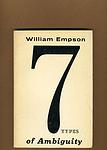William Empson
William Empson was an English literary critic and poet, widely influential for his practice of closely reading literary works, a technique he developed in his first major work, 'Seven Types of Ambiguity' (1930). Renowned for his complex and nuanced interpretations, Empson's work contributed significantly to the school of New Criticism. He was also a professor of English literature and had a profound impact on mid-20th-century literary theory.
Books
This list of books are ONLY the books that have been ranked on the lists that are aggregated on this site. This is not a comprehensive list of all books by this author.
-
1. Seven Types Of Ambiguity
"Seven Types of Ambiguity" is a seminal work of literary criticism that explores the complex and nuanced ways in which ambiguity functions within poetry. The author meticulously analyzes various poems to illustrate how ambiguity can enrich a text by adding multiple layers of meaning, thereby enhancing the reader's interpretive experience. Through seven distinct types of ambiguity, ranging from simple misinterpretation to deeper, more intentional ambiguities embedded in the structure of language and syntax, the book argues that the recognition and appreciation of ambiguity is crucial to understanding the depth and complexity of poetic expression.
The 5947th Greatest Book of All Time -
2. Milton's God
The book in question is a critical examination of the portrayal of God in John Milton's epic poem "Paradise Lost." The author delves into the complexities and contradictions of the character of God as depicted by Milton, arguing that the representation is deeply flawed and morally ambiguous. Through rigorous analysis, the author challenges traditional interpretations of the poem, suggesting that Milton's God may be less benevolent and more tyrannical than commonly perceived, raising questions about the nature of authority, justice, and free will within the text. The work is a provocative and scholarly critique that invites readers to reconsider the theological and philosophical underpinnings of one of the most significant works in English literature.
The 7168th Greatest Book of All Time -
3. Some Versions Of Pastoral
The book in question is a critical examination of the pastoral tradition in literature, which typically idealizes rural life and nature. The author argues that this tradition often serves to comment on complex social and personal issues, using the simplicity of pastoral scenes as a contrast to highlight these themes. The work explores how various writers manipulate the pastoral mode to address topics such as politics, class, and the human condition, revealing the depth and versatility of this literary form. Through close readings of texts ranging from classical antiquity to modern times, the author demonstrates the enduring relevance and adaptability of pastoral literature.
The 7168th Greatest Book of All Time -
4. Poems Of William Empson
The collection is an assemblage of the lyrical and intellectual works of a 20th-century English poet renowned for his complexity and ambiguity. It showcases a range of his poetry that delves into themes of human experience, language, and perception, often characterized by intricate wordplay and a deep analysis of literary tradition. The poet's technical mastery and his ability to weave dense metaphorical structures have cemented his reputation as a significant figure in modernist poetry, and this compilation serves as a testament to his poetic achievements and his influence on the landscape of literary criticism.
The 9832nd Greatest Book of All Time



